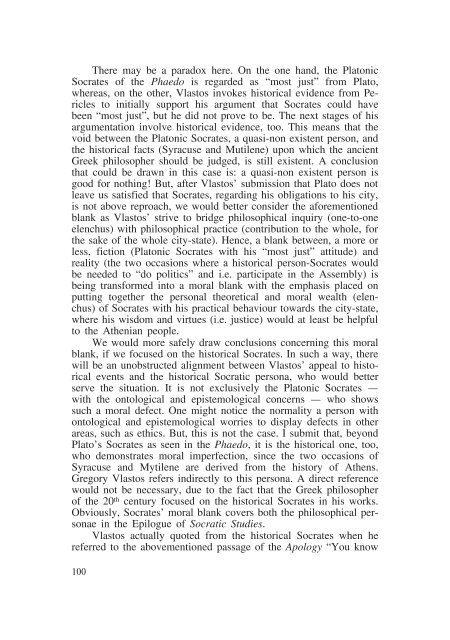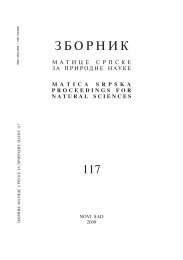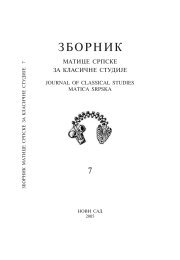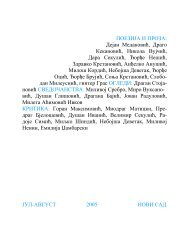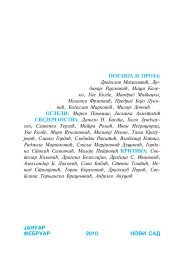You also want an ePaper? Increase the reach of your titles
YUMPU automatically turns print PDFs into web optimized ePapers that Google loves.
There may be a paradox here. On the one hand, the Platonic<br />
Socrates of the Phaedo is regarded as “most just" from Plato,<br />
whereas, on the other, Vlastos invokes historical evidence from Pericles<br />
to initially support his argument that Socrates could have<br />
been “most just", but he did not prove to be. The next stages of his<br />
argumentation involve historical evidence, too. This means that the<br />
void between the Platonic Socrates, a quasi-non existent person, and<br />
the historical facts (Syracuse and Mutilene) upon which the ancient<br />
Greek philosopher should be judged, is still existent. A conclusion<br />
that could be drawn in this case is: a quasi-non existent person is<br />
good for nothing! But, after Vlastos' submission that Plato does not<br />
leave us satisfied that Socrates, regarding his obligations to his city,<br />
is not above reproach, we would better consider the aforementioned<br />
blank as Vlastos' strive to bridge philosophical inquiry (one-to-one<br />
elenchus) with philosophical practice (contribution to the whole, for<br />
the sake of the whole city-state). Hence, a blank between, a more or<br />
less, fiction (Platonic Socrates with his “most just" attitude) and<br />
reality (the two occasions where a historical person-Socrates would<br />
be needed to “do politics" and i.e. participate in the Assembly) is<br />
being transformed into a moral blank with the emphasis placed on<br />
putting together the personal theoretical and moral wealth (elenchus)<br />
of Socrates with his practical behaviour towards the city-state,<br />
where his wisdom and virtues (i.e. justice) would at least be helpful<br />
to the Athenian people.<br />
We would more safely draw conclusions concerning this moral<br />
blank, if we focused on the historical Socrates. In such a way, there<br />
will be an unobstructed alignment between Vlastos' appeal to historical<br />
events and the historical Socratic persona, who would better<br />
serve the situation. It is not exclusively the Platonic Socrates —<br />
with the ontological and epistemological concerns — who shows<br />
such a moral defect. One might notice the normality a person with<br />
ontological and epistemological worries to display defects in other<br />
areas, such as ethics. But, this is not the case. I submit that, beyond<br />
Plato's Socrates as seen in the Phaedo, it is the historical one, too,<br />
who demonstrates moral imperfection, since the two occasions of<br />
Syracuse and Mytilene are derived from the history of Athens.<br />
Gregory Vlastos refers indirectly to this persona. A direct reference<br />
would not be necessary, due to the fact that the Greek philosopher<br />
of the 20 th century focused on the historical Socrates in his works.<br />
Obviously, Socrates' moral blank covers both the philosophical personae<br />
in the Epilogue of Socratic Studies.<br />
Vlastos actually quoted from the historical Socrates when he<br />
referred to the abovementioned passage of the Apology “You know<br />
100


